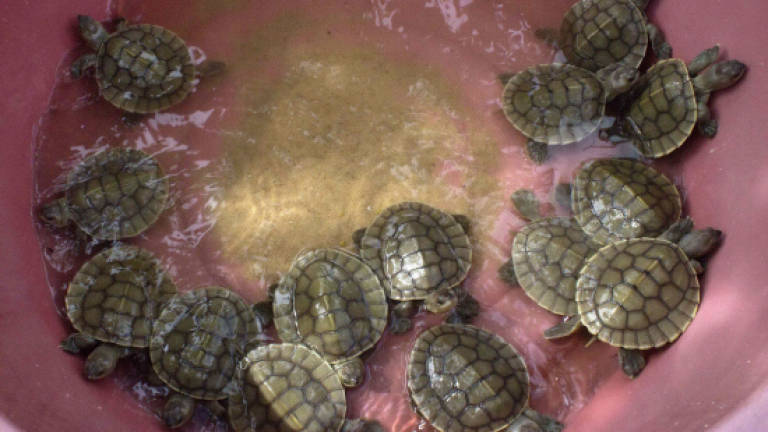Cambodia's last Royal Turtles on verge of extinction

PHNOM PENH: Efforts to save Cambodia's Royal Turtle, one of the world's most critically endangered species, are being hampered by dredging and illegal forest clearances, a wildlife conservation group warned Monday.
The Wildlife Conservation Society and the Cambodian government have been desperately trying to protect the tiny remaining pocket of batagur affinis turtles for more than a decade after their numbers plummeted.
But in a grim statement released Monday WCS said there were believed to be "fewer than ten" remaining in the wild and that the minute population was under threat from increased human activity in the small section of Sre Ambel river, where they still breed.
In Hul, the local project coordinator, said his team had observed a decline in nesting, blaming "increased sand dredging, wood transportation along the nesting habitat, and illegal clearance of flooded forest disturbing the females during the breeding season".
"Only one nest has been located this year, compared to four nests last year. This is very worrying and if it continues it will be potentially putting the species at high risk of extinction," he said.
The critically endangered animal acquired its name because only Cambodia's royal family was historically allowed to consume its eggs.
The Royal Turtle was initially believed extinct in Cambodia until 2000, when a small population was re-discovered in the Sre Ambel river.
In 2001, WCS and Cambodia's Fisheries Administration began a community-based protection program, hiring former nest collectors to search for and protect nests, instead of harvesting the eggs.
Since then, 39 nests with a total of 564 eggs have been protected with 382 hatchlings.
Hatchlings are then taken into captivity where they are raised until several years old and released. But WCS said ongoing habitat loss reduced survival chances.
Deforestation and poaching have devastated many species in Cambodia, one of Asia's poorest and most corrupt nations.
Earlier this month tigers were declared "functionally extinct" in the country, with the last big cat seen on a camera trap in 2007.
In its haste to develop, the government has been criticised for allowing firms to clear hundreds of thousands of hectares of forest land — including in protected zones — for everything from rubber and sugar cane plantations to hydropower dams.
The illegal logging trade, lubricated by violence and bribery of forestry officials and border guards, has eviscerated one quarter of the country's forests in a generation. — AFP